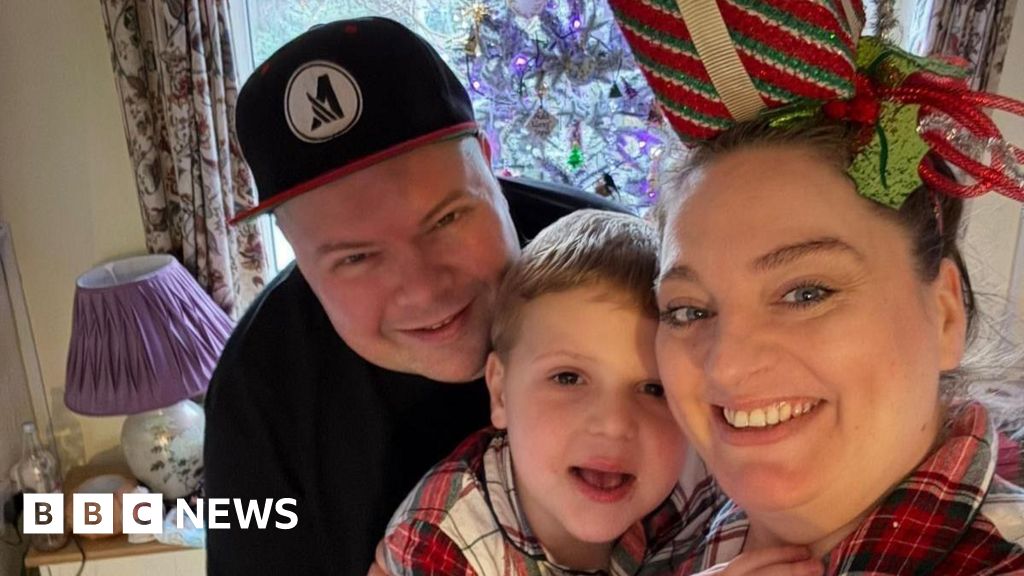Leo’s parents said he is “incredible”
A woman whose baby received a donated organ following the death of a teenager has spoken of her “guilt” about the fact someone had to die to save her son.
Claire’s son Leo, now four, received a liver transplant at five months old after several unsuccessful attempts.
She said knowing the liver would come from someone who had died meant she felt “guilty for wanting it, but you so desperately want it”.
Claire is now urging people to tell their families if they want their organs to be made available to others, adding: “If you would ever be willing to take an organ then you need to really think about being willing to donate.”
Telling Leo’s story to BBC Radio Bristol, Claire explained she and her husband Ollie had gone through “several miscarriages” before travelling to Greece to receive IVF treatment.
She said some scans during her pregnancy had been “borderline abnormal”, but there was nothing detected that related to Leo’s liver.
The couple, who live in Whitchurch, were told to expect a healthy baby boy.
Listen to Claire on BBC Radio Bristol
Leo was born at 38 weeks by C-section and everything seemed fine.
“We were just in heaven,” said Claire.
But about four weeks after he was born, Claire said she had “felt something wasn’t right”.
Despite being told it was normal because he was breastfeeding, she noticed Leo’s bowel movements were green.
“I didn’t feel like it was [normal],” she said.
As well as this, “he was just getting yellower and yellower”, she said.
Claire felt something was wrong and pushed for more intervention from doctors.
Five days later, Leo was admitted to hospital. He was then transferred to another hospital for a transplant four or five days later.
Family photo
Leo is now four years old and knows he has a donated liver
While four different livers were initially available for transplant, none of them were suitable for Leo.
“You’re seeing your child deteriorate before your eyes,” said Claire.
“I was scared to go to the bathroom, I was scared to get a drink. I was scared to leave him. He was so poorly.”
She said knowing the liver was likely to come from someone who had died was “one of the hardest things”.
“You’re praying and praying and praying for a liver and you know that is going to come at the cost of somebody losing someone they love,” she said.
“You feel guilty for wanting it, but you so desperately want it.”
Family photo
Claire said she was “hyper-vigilant” with Leo’s symptoms
A suitable liver became available from a teenage boy who had a brain tumour.
“The decline was very rapid for him and he made it very clear to his parents that he wanted his organs to go and help others,” said Claire.
Following a successful transplant, Leo’s parents started to see changes within 12 hours.
His mum described his skin on the way to his operation as “almost greeny-yellow”, but after his transplant, while in intensive care, his colour developed and was “probably halfway better”.
“You just can’t believe that difference,” she said.
Family photo
Leo knows he had a liver transplant because his parents do not want him to be “anxious or embarrassed about his scars”
“There is a real shortage of donors,” said Claire, explaining families often override their relative’s decision to donate.
Unless individuals “opt out” on the NHS Organ Donor Register, the law assumes they are consenting to organ donation, although ultimately families still have the final say.
But with some unsure of their relative’s preference, NHS data shows an increasing number of potential donations are being refused.
Claire is urging people to have the conversation with their family.
Every year, Leo’s parents celebrate his “liver birthday”.
“Every milestone that Leo reaches, it’s his, but it belongs to the donor family too,” Claire said.
“Without them, we wouldn’t have Leo.”
